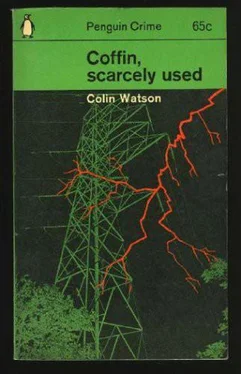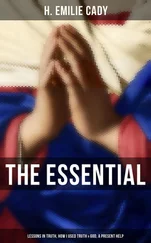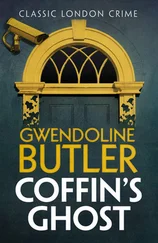The inspector shrugged. “The more the corpses, the closer the survivors will stick together. That particular board of directors has narrowed considerably of late.”
The car turned into Heston Lane and sped past the tall villas behind their hedges of evergreen and the mournful laurels. As it slowed just before the last two houses, Purbright said: “You’d better see if you can root any sense out of the Poole woman, Sid. I’ll try next door.” They got out. Purbright left Love regarding the now closed gates of The Aspens.
A moment later he stopped in his tracks to Mrs Carobleat’s porch. Love had called out loudly and excitedly. Purbright frowned and walked back to the road. He was met by the sergeant, glowing and gesticulating. “Don’t froth,” said Purbright testily. He found demonstrative policemen as embarrassing as sentimental lawyers, or muscular clergymen.
Love led him back to the entrance to The Aspens. They entered the drive and turned. Love pointed to the handle that lifted the latch securing one wrought-iron gate to the other.
“Where have you seen that before?” he asked in cryptic triumph.
Purbright grunted and bent down to look more closely at the handle.
The iron had new, bright rust upon it where it had been scraped or rubbed clean fairly recently. It was wheel-shaped and about three inches in diameter. The spokes were decorative and formed a flower pattern, rather like a daffodil.
“Yes,” said Purbright, standing up. “Yes, indeed.” He began examining the rest of the iron-work from the central leaf to the heavy timber pillars that supported the gates.
At the top of the right-hand gate, near the wooden post and on a level with his head, he found another scarlet patch of recent rust. He pointed it out to Love and said: “Here’s where Gwill’s volts were introduced, Sid. And here”—he made as if to grasp the iron daffodil with his other hand—“is where they were delivered.”
“Just what I thought,” said Love. “That’s why I...”
“Of course,” said Purbright. “You were quite right to mention it.” He gazed at the hedge that divided the front garden of The Aspens from its neighbour. “A cable run along that and clipped to the top of the gate. It couldn’t have been spotted in the dark. Probably not in daylight, for that matter. The question is, Which house was it led from? Gwill’s or Mrs Carobleat’s?”
Followed by Love, he moved slowly along the side of the hedge, scrutinizing the frost-hardened earth beneath it. About half-way along, he saw a glint of bright yellow among the dead twigs and leaves. He picked up a short length of adhesive wrapping tape and carefully removed the fragments that were sticking to it. He pressed the adhesive side down on a page of his notebook and showed it to Love.
The piece of tape had been cut off through three lines of printing, leaving —NWELL LTD. at the top, —IO AND TV below it, and —DLOW at the bottom.
As they were looking at it, a voice just behind them croaked with querulous sadness: “Have you come to stake him down? Have you, sir?”
The policemen wheeled round and stared into the grey, unhappy face of Mrs Poole.
“Good morning,” said Purbright with automatic courtesy. Then, realizing the oddity of her question, “Have we come to what?”
She looked at him for several seconds and shook her head doubtfully. “No,” she murmured, “no, I suppose that’s not your job. But somebody ought to. You’d never have thought their hair would keep growing, would you? But it’s natural enough, really, I expect.”
“Yes,” said Purbright, uncomfortably, “I suppose it is.” He noticed the woman looked much older out of doors. Her features seemed far more ravaged than when he had last spoken to her.
Mrs Poole passed a trembling, skinny hand over her little pursed mouth. “It wasn’t here, you know,” she said. Tilting her head, she added: “Round the back, as a rule. Except when he fixed up the wireless just before I went to Libbie’s.” She giggled weakly and a tear started to slide down the grey curtain of her cheek.
Purbright gave Love the flicker of a glance, then took Mrs Poole by the arm and led her back towards the front door. He held his head low and spoke to the ground. “Libbie’s your sister, is she?” he asked. She nodded emphatically.
“So the wireless was fixed that morning—was that it?”
“Early on. Only just light. Only...” She spoke dreamily, groping for words.
“You saw something, then, did you, Mrs Poole? Something out here?”
“I was getting up, you know. You look out of a window and there you are. You’re never the first. Not in winter, even. Mind you”—she suddenly looked at him sternly and spoke low and fast—“mind you, it’s my opinion he was never far away all night, so it was small credit to him to be there, already up and whiskery and busy with his aerial over the hedge to get the eight o’clock news.” She snorted and rubbed her hands on her pinafore.
Purbright stopped in front of the porch and faced the house-keeper. “Who, Mrs Poole?” he asked. “Who was it fixing the wireless that morning?”
She slowly drew up a hand and began fingering her chin with little fluttery movements. She made no answer, but moved back to the door, staring at Purbright as she retreated. Just before she disappeared, she announced with dignified lucidity and a fleeting smile: “Mr Gwill keeps rather to himself these days, but I shall tell him you called.”
Chapter Sixteen
The man behind the wheel of the squat black van was not fond of driving for its own sake, even in the rolling dairy-lands of the Westcountry that contrasted so strongly with the utilitarian, arable flatness that surrounded Flaxborough. He glared despondently through the windscreen at the unpredictable road ahead, snaking between high banks bearing their rain-heavy tangle of dead cow-parsley, vetch and spear grass. To his companion he said not a word.
It was still light enough to see Glee Hill crouching like a lonely old sheep dog in the mist away to the left. On the near side of it, a small forest of skeletal trees held tapering, motionless fingers against the slate-coloured sky. The occasional road-side cottage, withdrawn against a leafless, dripping orchard or standing amidst a forlorn garden of soured, broken potato plants and stripped orussel stalks, showed no sign of occupancy. Here was a landscape gone to seed and bedded down to rot quietly until spring.
At the next cross-roads, Dr Hillyard steered the van carefully to a stop against the verge and studied a map. He also drank gratefully from a silver flask and lit a cigarette. Then he checked the map with the signpost and drove off into the right-hand turn.
The road descended steeply through a dank plantation and drew level beside a stream. This was crossed by a humped bridge that carried the road to the beginnings of a village. Before entering its main street, flanked by a hall, some stone-built houses and a couple of shops with lighted windows, Dr Hillyard chose a sharp left turn and drove slowly past an inn, a farm entrance and a long, low wall that appeared to enclose the grounds of a manor house, the chimneys of which topped a huge yew hedge at the end of some rough pasture.
About half a mile farther on, the road forked. At the junction was a triangular patch of asphalt and on it a telephone kiosk. Again Dr Hillyard pulled up. This time he got out of the van, crossed to the kiosk and entered it. He took a piece of paper from his pocket and compared what was written on it with the dial of the telephone.
Mr Bradlaw watched from his van’s passenger seat. He shivered in the chill dampness that crept through the floorboards and slid round the cab’s windows and doors. His legs tingled and ached. Disentangling them from the rug he had wrapped around him, he opened the door and climbed heavily to the road as Hillyard shouldered his way out of the kiosk.
Читать дальше












